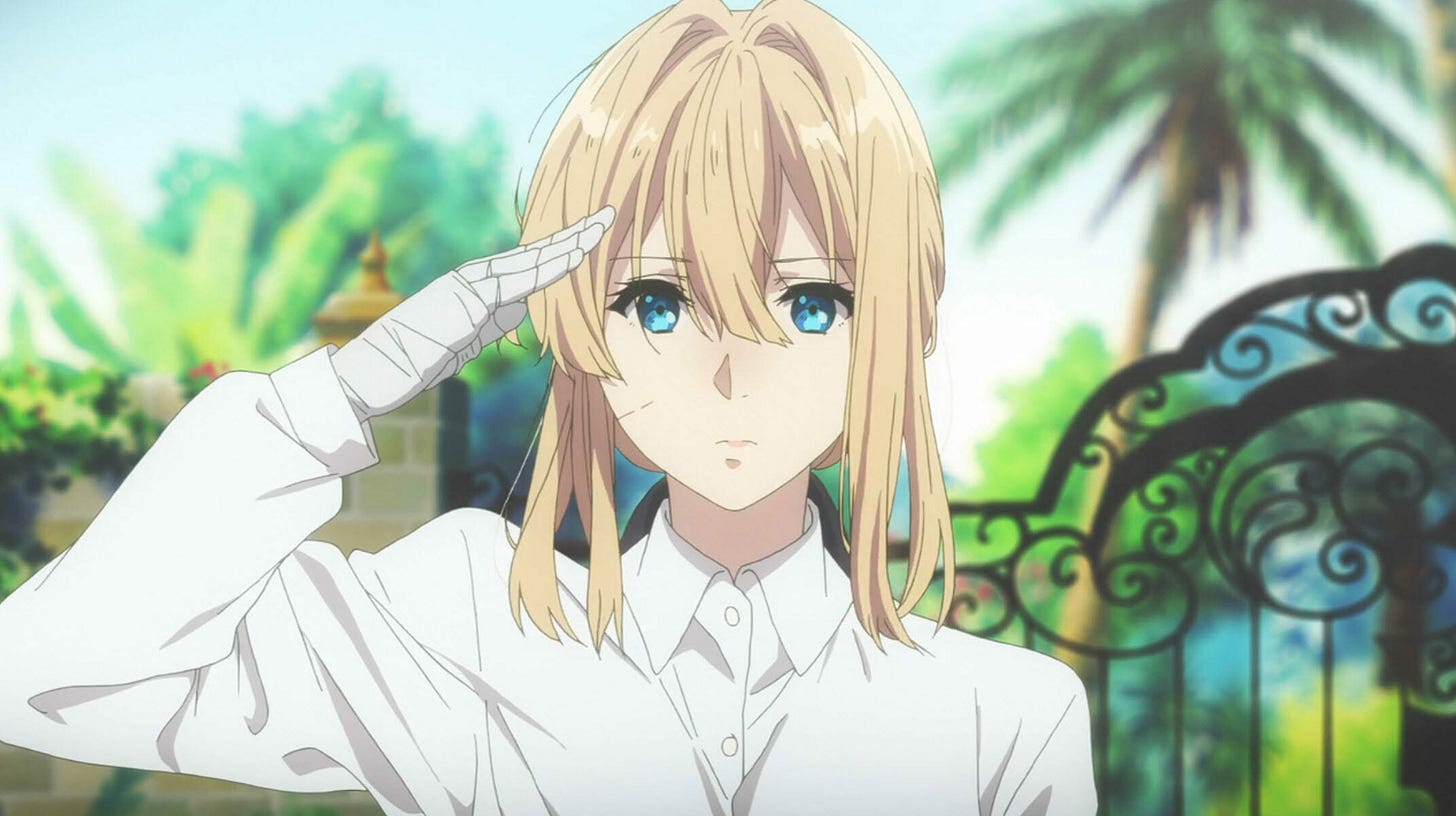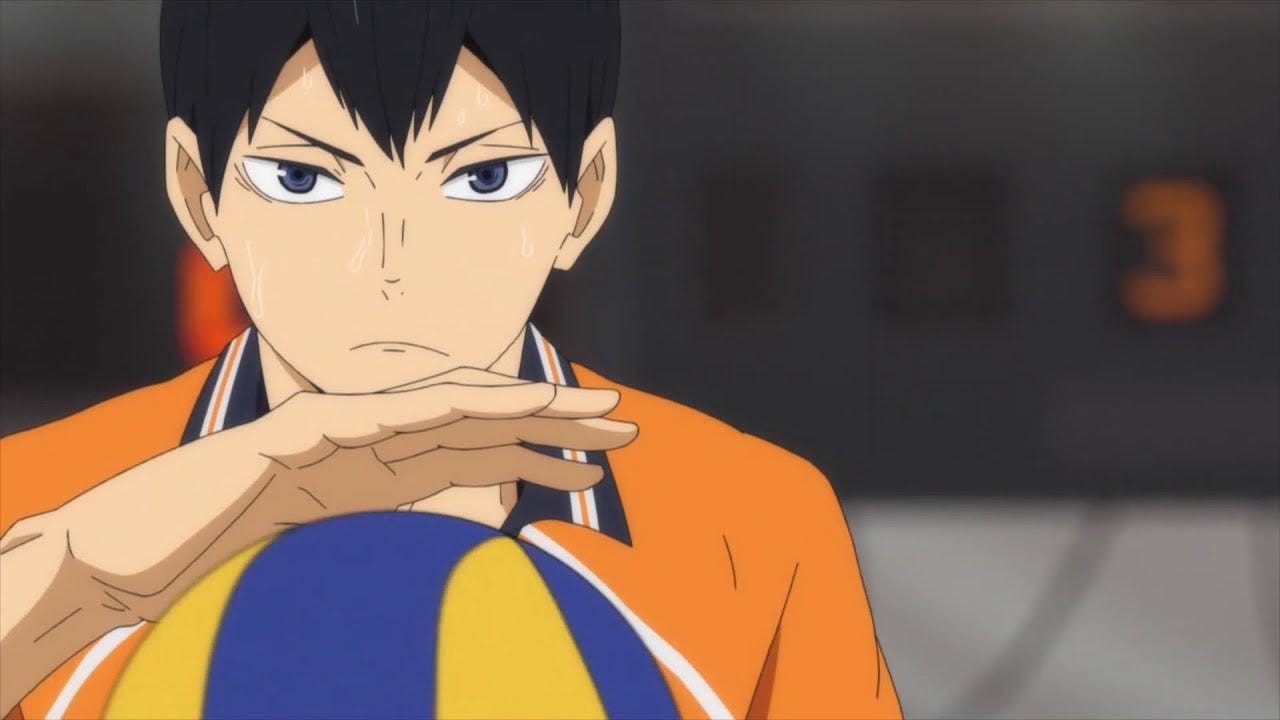Neurodiversity in Anime 2 - Violet Evergarden & Kageyama Tobio
Good evening! Thanks for those precious subs fuelling me to stay up past ten churning out the content y’all love so much.
I was gonna write another Gunbuster ep review for y’all but once I get started on one of those I don’t stop until I’ve got like 4000 words or so. Episode 3 is an especially potent episode so I just know I’m gonna want to explore that in depth. Adding to that is my newly reawakened desire to climb the ranks in Street Fighter 5. I’ve been busting heads and I just can’t get enough of it.
On top of that I’ve got another episode of the podcast that I need to edit for Saturday. We only discuss two episodes of Hataraku Maou-sama, but somehow it’s just as long as the last couple eps we’ve been putting out. I also have to prepare some notes for another recording session this weekend. We’re closing out Maou-sama and we’re gonna have to start thinking about what to cover next.
So yeah, I’m very busy, and very excited. What’s most exciting, though, is the character profiles I’m writing for ASD/neurodiverse representation in anime. I’ve been having so much fun writing these! I shake them out with such ease. It surprises me how a closer look at these characters I love reveals a whole other dimension to them and their inner lives. I hope people find this as enriching as I do.
I’m sorry if you were looking forward to reading about Gunbuster. Here are a couple more profiles to make up for it. Gomenasai!
Violet Evergarden (from Violet Evergarden, 2018)
Violet Evergarden is a series that takes place against the backdrop of a romanticised early 20th century European fantasy setting. It’s your typical BBC period drama with just a hint of steampunk to keep things fresh. Our heroine is the eponymous Violet Evergarden, an employee of the CH Postal Company, where she serves a very particular function - that of Auto Memory Doll. What this means is that people seek out her services in order to write the letters that they themselves are unable to write.
The training and reputation of Auto Memory Dolls is such that they do not serve merely as secretaries taking dictation. Rather, they act as councillors, diplomats and astute listeners in order to tease out the hidden meaning and true intention on the part of the letter writer and commit that to paper. Both the illiterate and literate seek them out in order to put into words their innermost thoughts and wishes.
So, Violet is a member of this guild, but something else sets her apart. She is the veteran of a destructive war in which her aptitude for combat led to the deaths of many enemy soldiers. With the war now passed, she is wracked with a deep regret, the extent of which very gradually reaches the surface of her consciousness. Living with the effects of Post Traumatic Stress is a major part of Violet's arc, so is atonement for the grief she’s caused through her service as an Auto Memory Doll. But there is more to her psychological make-up than this.
At the earliest phase we get to see Violet; she is forcibly brought under the care of Major Gilbert Bougainvillea, a prominent military officer. She is shown to be mostly non-verbal, responding to any proximity from people or stimuli with intense fight-or-flight reaction. In time she grows accustomed to Gilbert, betraying a history of being used for violent ends. We also get to see Violet in her “normal” state; she displays a very reduced affect, unconsciously expressing her emotions through subtle body language instead. She is also very receptive to the routine and structure of the military. She excels at doing repetitive seeming tasks and interprets any orders given to her in the most literal manner. Once assigned to a task she carries it out with a precision that may seem obsessive, she doesn’t stop until the task is completed, going so far as to neglect other needs. These traits make her an extremely useful soldier, but Gilbert refuses to see Violet as simply a tool. He teaches her how to read and write.
Later in the series Violet has a difficult time separating her military past from her new life as a post office employee. At first the thought of no longer taking orders from the Major upsets her, having her routine broken. She still habitually applies military terminology in her civilian life - “mission accepted,” “Roger that,” etc.
Violet’s new life as an Auto Memory Doll is where most of the drama is found. She takes to typing and dictation with tremendous ease, but she struggles with the nuance and subtext required to meet the emotional wishes of her clients. At other times she is hyper-perceptive, being able to “cut through the bullshit” with an immediacy and bluntness that may seem inappropriate in certain settings. A lot of the show’s humour and sweet moments result from Violet’s unintentional rudeness. Violet learns to make this into a strength for her.
Violet Evergarden is a show about the myriad things in our lives we’ve left unsaid, the things we should have said. It’s about love, loss and the possibility of expressing that in a way that is liberating and cathartic. It’s also about the power of a good listener; the power that a thoughtful, considered letter can have to change how you see the world around you.
Violet faces many challenges in her career as an Auto Memory Doll. Many of those challenges stem from the way she is, simply moving through the world the only way she knows how. But she has a goal, and we see her learn and grow towards that goal. She wants to understand the meaning of the words “I love you,” a phrase she heard in the midst of warzone. As she meets new people, makes new friends she comes closer and closer to understanding, and so do we.
—//—
Kageyama Tobio (from Haikyuu 2014)
Haikyuu is a series about a team of sweet, good boys trying their hardest to become the best high school volleyball team in their prefecture, and maybe even Japan.
Haikyuu's main character is the tenacious Hinata Shoyo, a new arrival at Karasuno High School with a tremendous vertical leap for someone of his 5'4" stature. But really, the many members of the Karasuno boys volleyball team each get their time in the spotlight. Haikyuu offers a varied and interesting cast, each with their own goals to accomplish and challenges to overcome. Even peripheral characters and opposing teams get fleshed out back stories making them feel rounded and believable. This is the great strength of Haikyuu - in fully developing the motivations of everyone participating, the wins are made to feel more gratifying and the losses more crushing.
Haikyuu is forced to communicate a great deal with very little. The moment to moment of volleyball is stretched atemporally giving us a glimpse into the characters' inner lives between each serve and receive. That's why I think it's so ironic that one of Haikyuu's best characters is also its worst communicator.
When Hinata Shoyo first arrives at the Karasuno volleyball court, he encounters his bitter one-sided rival from middle school - Tobio Kageyama. They make for unlikely teammates, and like the best of anime duos, their personalities serve to amplify each other’s flaws and strengths.
When Kageyama realises that - since graduating to high school - he is now on the same team as Hinata, he has a difficult time seeing him as a teammate or even as a person with his own desires. Instead he sees years of wasted volleyball potential, a notion that causes him to feel shame and resentment.
One recurring motif of sports anime is natural talent versus grit and determination. Can someone who works their butt off ever come to match someone who is simply gifted, and always has been? In this equation, Kageyama is the talent and Hinata is the grafter.
Although, to say Kageyama is talented is an understatement. It is correct, in every sense, to say he is a savant when it comes to volleyball. His deftness at ball handling, timing, positioning and strategy are impeccable. He is always the picture off total focus during a match even as the rest of his team are withering under pressure. His skill allows him to harness Hinata's raw speed and jumping power, thus maximising the ability of the players around him. He's so good, in fact, that he could practically play the game on his own.
In his middle school days, Kageyama earned the nickname "king of the court". Not because of his graceful performance, but because of his autocratic style of team leadership. He continually demanded of his teammates to meet his level of proficiency, any failure was met with harsh criticism and sometimes even abuse. Sadly, Kageyama did not realise he was alienating his teammates until it was too late.
This never struck me as the behaviour of someone who felt superior to his teammates. Rather it is the unpractised, socially unskilled response of someone solely interested in volleyball, venting his frustration when he finds that the people around him can not offer the same level of commitment. That's also why he responds with shock and confusion when he finds that no one wants to play with him anymore. "I thought everyone felt the same way about volleyball that I did," he seems to think. This is why, despite the rough edges of his character, I empathise greatly with Kageyama.
Though he is a genius of volleyball, we discover that he is not good at much else. He is barely able to keep afloat academically and he shares no other interests with boys his age. All his effort is reserved exclusively for volleyball to the detriment of everything else. He practices long after everyone has gone home and is the last person during a match to admit his exhaustion. We find that he also has trouble modulating his volume appropriately and maintaining acceptable eye contact. He either chooses to avoid eye contact or fixes an intense glare on you when dissatisfied.
It is not uncommon to find the savant trope in anime. But it is rare to see it front and centre, rather than as a tertiary character. It is also rare to see it treated with such care. Kageyama's skill is praised and sought-after by coaches and talent scouts, but it is the skills he learns from his teammates that become the most valuable. Though he has made volleyball his entire world, he discovers that it is not possible for him to live in it alone. And, with his friends by his side, he finds that he no longer wants to.




